Here are the final three China updates, emailed separately but posted together:
Go West (Update #7)
When I woke up, I couldn’t feel anything below my waist.
Don’t worry, I’m not paralyzed; but I imagine the feeling I experienced to be similar. I was riding a hard seat train overnight to Xi’an last night, and forced to contort my body into countless uncomfortable positions in order to rest my head against something comfortable. Like my knee; or a table. It reminded me of other terrible transportation experiences in the past (like the ‘fish bus’ or the ‘vomit ferry’ from Africa #4 update), except that the story I have is not quite as entertaining: I spent 10 hours on a dirty train sleeping in 5-10 minute periods, and didn’t get up once for fear of losing my awful seat to something much worse.
Hard-seat is a very interesting mode of train travel; once all the seats sell out, the tickets keep flowing. People cram the car beyond the clearly posted capacity, standing where they can or commandeering enough real estate on the side of someone else’s seat to place a butt-cheek. In the past when trying to visit my friends in their hard-seat car, I swam through one train car of people before giving up and returning to my hard-sleeper car. It’s crowded.
In Beijing I was joined by Jordan and saw the necessary sights nearby. I was struck by a few things, which made the city my least favourite so far in China.
– the people were the least friendly, and a few tried to rip me off (for $0.80; and they failed)
– their Mandarin is horribly difficult to understand, as they mumble and say “arrrr” a lot, like pirates.
– their ability to understand, or patience to attempt to understand, my ‘Mandarin’ was lacking
– the city is really sprawling and the sights aren’t ‘exciting’ as much as they’re ‘historically significant’.
But there were some great things too. Like the Metro system, which was super cheap ($0.30) and featured computer animated educational videos about various olympic events. And of course the Great Wall was beautiful; we hiked it with a young surgeon we met there from Beijing, originally from Inner Mongolia. I reminded him that the wall was built to keep Mongols out of China. His english was poor so he didn’t understand me. But I laughed enough for both of us.
Another awesome Beijing experience was the enormous mall of Silk Street where you can find replica watches, jeans, shoes, suits, ties, polo and lacoste shirts, goretex, and softshell jackets, all being sold cheap by pretty young women who think I’m handsome (they wouldn’t flatter me just to get a sale, would they?). I usually warned them before I began bargaining that they’re going to hate me before we were finished, because I bargain hard. As is the case everywhere in China, the people have number tags instead of name tags, and I always ask their *Chinese* name (since most have an ‘english’ name for foreigners). One girl selling watches had a particularly difficult Chinese name — but a pin of Snoopy on her vest. Throughout the entire negotiation I kept calling her Snoopy and trying to contain my laughter (and Jordan’s) over her half-laughing, half-annoyed protests about her actual name. I bought the watch from her, so everybody wins.
Now that I’m accompanied by Jordan (a Canadian of Chinese ancestry, who speaks no Mandarin), the locals here assume he’s my tour guide, and ask him permission to take my photograph. After he finishes staring at them blankly, I reply in broken Mandarin that my friend doesn’t speak any Mandarin, and yes they can take my photo.
So, now Jordan and I are heading to the western extremity of China. Our plan to Mongolia fell through on account of train unavailability, flight and visa costs, and inadequate time to plan and execute a proper tour. Instead we fought with Chinese bureaucracy to have his pathetic 12 day visa extended — a fight that took 3 days, 7 visits to a bank, 3 visits to the visa office, and $3500 — and we’re going to see Xinjiang province. The province is a country unto itself: It makes up 1/6th of China’s size, borders 8 countries, and has completely different languages, cultures, and foods. And should be less busy than the Beijing area!
I’ve added some more photos of course; find them here.
New Frontier (Update #8)
In this edition: We learn about guanxi; Jordan nearly falls in a man-hole; the bureaucratic headache continues with a creepy twist; and we see how far from “Chinese” you can get with two consecutive 24-hour train rides.
On the train the other day I was recalling ideas about “Chinese food”. As a child, Chinese food was oily fried brown rice, spring rolls, and shrimp or chicken balls covered with impossibly red syrup. When attempting to a explain fortune cookies to Chinese friends we met on the train I burst into laughter — they had never heard of such things. I realized that in over 50 days here I have yet to see any of the aforementioned foods.
We also discussed with my new friends the idea of guanxi (‘connections’). In China you need guanxi to get good jobs, apartments, or into good schools. It’s not what you know but who you know. For people considering immigrating to Canada who feared their lack of guanxi, we had to explain that things don’t work the same there.
Jordan and I have been moving steadily westwards after escaping the bureaucratic nightmare in Beijing. A 24-hour train ride brought us through Gansu province into Xinjiang; through poor and sparsely populated areas full of energy resources (coal and oil); and across Gobi landscapes. On more than one occasion we witnessed a coal mine out one window, and nodding donkey oil pumps out the other. And hours later we passed through Asia’ largest wind farm.
A land of extremes.
Arriving in Xinjiang we felt we landed on another planet. The people look and dress nothing like the typical Han Chinese; nor do they eat the same foods, or speak the same languages. We saw ginger-haired children with green eyes, men with long pants and kufi hats, and head-scarved women with thick unibrows. There were mutton dumplings and bagels everywhere. Signs that weren’t just in four different languages, but four different alphabets! Greeting people in Mandarin, Arabic and English in a span of 10 minutes. Police with bullet-proof vests and automatic weapons (this province borders eight countries, many supposedly harbouring Muslim extremists). And like mentioned in the intro, manhole covers that are faulty: We’ll never step casually onto another Chinese manhole cover again after one trap-door nearly swallowed Jordan.
Now for the creepy story:
Last night at 2am a heavily accented man opened Jordan’s dorm room and asked “Which one of you is Canadian….?”
The American girl replied with her nationality, while Jordan smartly kept his mouth shut and pretended to sleep. The man quietly slinked off into the dark. I was awoken in the next room to Jordan’s story, and we both slept uneasily the rest of the night. I had a wild nightmare.
In the morning after I confirmed with Jordan that I wasn’t dreaming, the boss stopped us at our door. He demanded we show Jordan’s visa — which we don’t have, because it’s in Beijing being extended. We were then put on the telephone with a heavily accented police officer who would only speak and not listen. He yelled for a bit, then hissed, “You must leave Kashgar. Now.” and promptly hung up.
But no need to worry! We should have things sorted out soon.
I’ve uploaded more photos to the China album, especially from Kashgar’s famous Sunday Market. The people look amazing, and aren’t what you expect from China.
Escape from Xinjiang (Update #9)
The policeman on the phone hissed,
“You must leave Kashgar. Now.” and hung up.
That’s where the story left off before.
Some background: After 5 days of painful bureaucracy (an entire story itself) in early July, Jordan got his visa extension granted by the Beijing police. They kept his passport and gave an official government receipt, and said very clearly that we could travel anywhere within China using this receipt as his passport replacement.
We did just this for a few weeks, until we reached the edge of the world in Kashgar where, thousands of kilometers from Beijing, the ‘laws’ are whatever the police make up. (The Chinese proverb states “The mountain is high, and the Emporer is far.”, which means the authorities do whatever they want)
Back in Kashgar, we did as he instructed — we left town. Not permanently, but for 2 days to visit the beautiful Karakoram Highway and the Pakistani-border city of Tashkurgan. Of course this isn’t what he meant when he said get out, but we’re too clever to listen to instructions plainly.
(Digression: On the highway trip we had to cross 3 military checkpoints. Our tour operator is big and has plenty of ‘guanxi’, or connections, that I spoke of in Update #8. When the military denied Jordan passage, our driver phoned the commanding officer directly, who arrived in minutes to order that they allow Jordan through. This was a real eye-opener — to fudge the paperwork, it was recorded that we were German!).
Upon our return to Kashgar we had to stay one more night to catch an afternoon train the following day. Early in the morning the day of our train departure we went to the tourist police station to ask for Jordan’s visa number, so we could appease the hissing, accented officer who was complaining 3 days prior. This turned out to be a really bad idea.
The woman hardly asked us what we wanted before snatching Jordan’s all-important government receipt (his ‘passport’) and grabbing the telephone to make call after call. We had a bad feeling.
Minutes later the police arrived and we were arrested and brought to the real police station for interrogation. This was pretty interesting.
Our lovely policeman — who named himself “Max” with a laugh — flip-flopped between telling us that we completely misunderstood the Beijing police instructions; and that the Beijing police were ‘crazy’.
Max hand-wrote a 5 page confession, in Arabic, that Jordan had to sign and thumb-print with ink in 30 places.
During the hours I sat in the police station, Max’s partner “Abdul” sat nearby, overwhelmed with his duties: He balanced his time between drinking tea, staring out the window, and drumming his fingers on his desk. At one point an old man wandered into the office and silently handed him $800 cash.
To make a long story short, we were still being questioned within an hour of our $120 train departure time, with all our bags unpacked in our hotel across town. And within 5 minutes of our train departure, we still hadn’t boarded (but we were moving pretty quickly towards the station!).
We made the train literally as it began to pull away, but to escape in time for this, Max forced Jordan pay an $80 fine/ransom/bribe to let us out of the cop shop. Jordan almost laughed out loud at the piddly sum, considering the 4 annoying hours it took the officer to issue the fine.
But the fun wasn’t over yet.
In our next city — Turpan, the hottest place in China and second lowest place after the Dead Sea — the hotelier saw Jordan’s receipt (his pseudo-passport) and immediately reached to phone the police. My heart sank, aiya! And we had no evidence of the fine he just paid!
Fortunately the ridiculous climate (44 degrees everyday we were there) meant the town shuts down in the afternoon. The police were closed! Huzzah! We very suspiciously slinked away from the hotel, and spent the next 2 days hiding in the basement of another hotel with Jordan checked in as a New Zealander named Tarn (another story). Every footstep in the hallway made us freeze in fear, and I contented myself by consuming a kilogram of the most delicious grapes each day (for $0.75!).
To make things even more fun, all the internet bars in the city were closed to foreigners, so we had to secretly use the one temperamental machine in the back of the hotel’s cafe to reach the outside world.
Then we discovered as I tried to change my flight that the website was blocked by the Chinese government’s Great Firewall – but just for flights connecting our ‘terrorist’ province and Beijing, all other flight combinations were okay. Authoritarianism can be rather inconvenient.
Today, from the comfort of Beijing, we read some shocking news. Yesterday, 16 police officers were killed — by truck, grenades, and swords — outside the same police station where we were interrogated last week.
It seems that karma caught up with the police in Kashgar, in a very bad way.
– – – – – – – – – – – – – – – – – – –
Tomorrow Jordan and I leave China, and I head to Japan for two more weeks of lessons in East Asian culture. Visit my Flickr to see a photo summary from from my 8+ weeks in the Middle Kingdom: China.
Nimen de pengyou,
-Mike

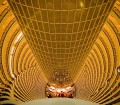
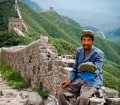
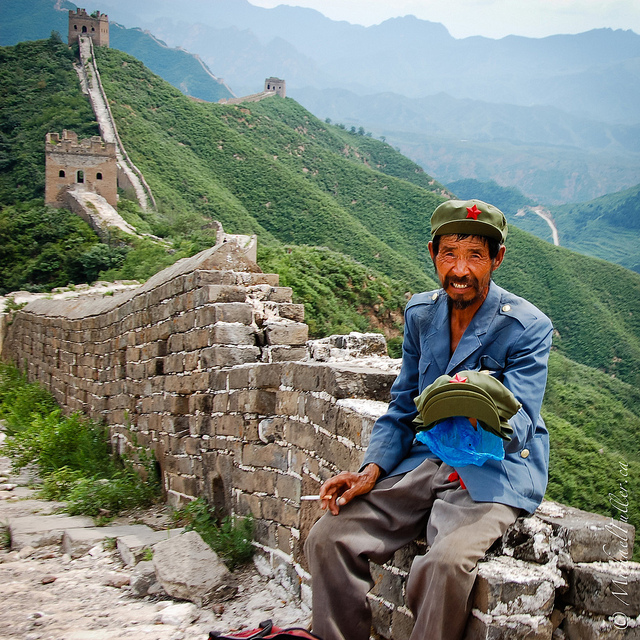
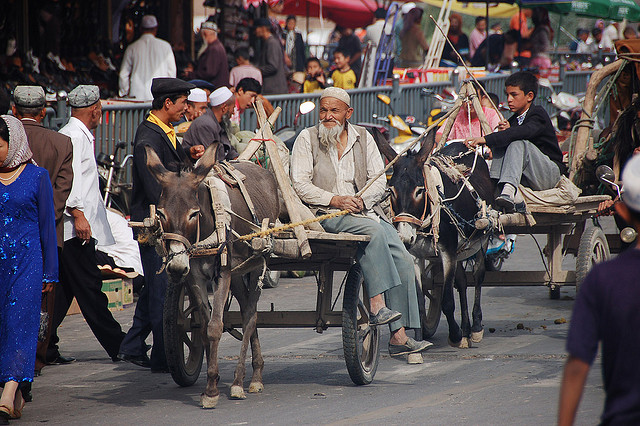
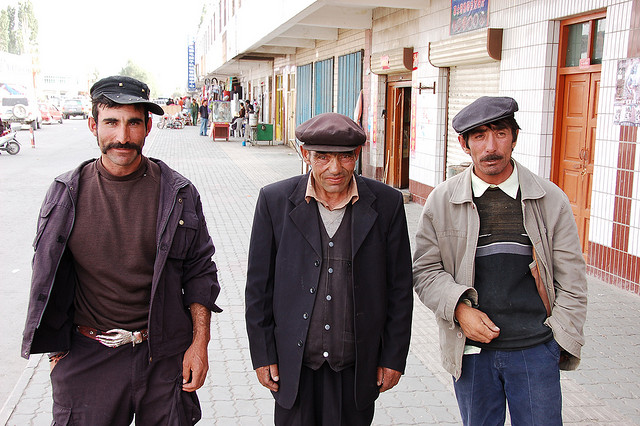
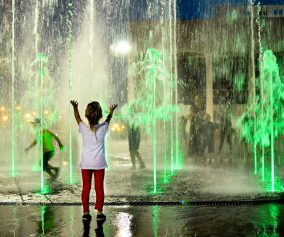
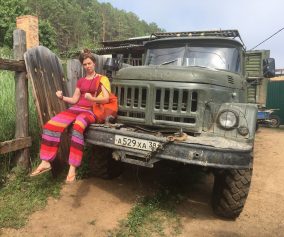
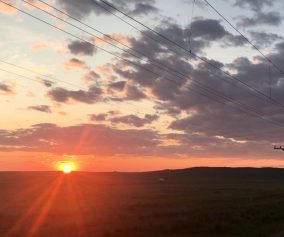
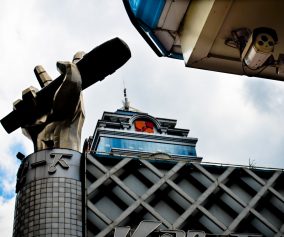
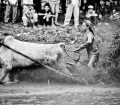
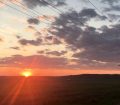
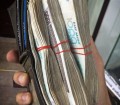
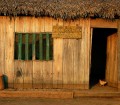
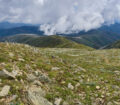
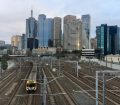



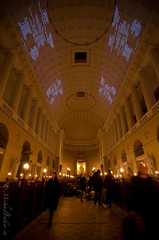


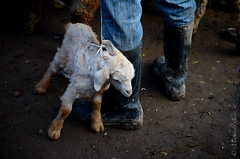

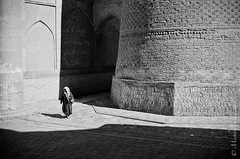

[…] travel moment: Getting arrested in China (and narrowly missing a subsequent terrorist […]